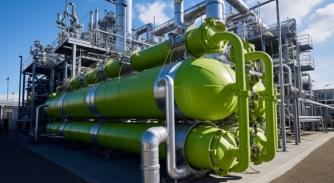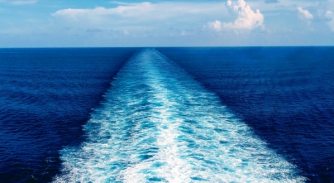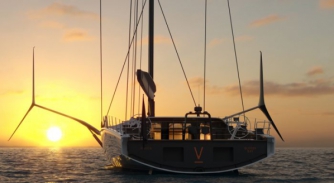Sustainability is not always compromise
Sustainability doesn't always have to be solely for the sake of people and the planet…
Sustainability is often perceived as a compromise to achieve cost savings and environmental impact reduction. However, in many cases, environmentally friendly solutions can also provide other advantages that make them preferable within their respective industries.
During my visit to the Southampton Green Boat Show earlier this year, I encountered Onesail's 4te sail, which is recyclable and certified according to the ISO 14040 production standard. Interestingly, these sails were primarily designed to perform better, with sustainability as a secondary consideration.
The sail's composite structure, incorporating high-modulus fibres and a new low-stretch component, eliminates the need for glue and mylar film, which are weak points in traditional laminate sails. This unique structure then allows the sail to be recycled at the end of its life, aligning with the principles of a circular economy. The recycled material can also be used to create other products, showcasing the broader benefits of sustainable design.
Reframing the product as a performance first choice, with inherent sustainability credentials, breaks the traditional association we have with sustainable solutions.
Washdown cleaning products offer another such example. The next generation of these products, driven by both crew and environmental concerns, are enzyme-based rather than relying on toxic chemicals. Moreover, they are sold in concentrated form, reducing plastic production, waste, and shipping costs. This not only promotes eco-friendly cleaning practices but also benefits the crew by reducing exposure to harmful chemicals.
The most direct, and understood avenue to environmental savings is via improved efficiency. Shipyards and naval architects understand well that through the design of more efficient hulls and propulsion systems, or the adoption of efficiency-enhancing products, they can significantly boost efficiency.
For instance, hull coatings can improve fuel efficiency on cruise ships by nearly 10 per cent, while LEDs consume 80 per cent less energy than traditional lighting. Increasing efficiency not only cuts fuel consumption and operational costs but also reduces energy demand, a crucial step toward achieving net-zero emissions and greater sustainability.
Reduced drag hull coatings and waste heat recovery systems were adopted initially because they save commercial operators money via reduced fuel consumption, not because they are greener options. But does that matter?
Sustainability has gained prominence in various industries, driven by regulatory requirements and social motivators. While no sustainable solution is perfect and often comes with a mix of pros and cons depending on the application, the examples discussed above demonstrate instances where the advantages, combined with sustainability credentials, make these options a valuable and viable choice from an economic standpoint first.
As we continue on our journey toward improved environmental impact, it is essential to recognise that sustainability solutions will evolve. Growing demands for sustainability, driven by legislation, will force further adoption, investment, and development of these solutions. With each step forward in pursuit of sustainability, the advantages will grow, and the disadvantages will diminish.
Shipyards, operators and owners will seek solutions that are more cost-effective and efficient. A growing number of sustainable solutions, like those outlined, already meet both criteria. It's on us to reframe the sustainability question. It's not always a compromise, often it is just a smart business decision.
NEW: Sign up for SuperyachtNewsweek!
Get the latest weekly news, in-depth reports, intelligence, and strategic insights, delivered directly from The Superyacht Group's editors and market analysts.
Stay at the forefront of the superyacht industry with SuperyachtNewsweek
Click here to become part of The Superyacht Group community, and join us in our mission to make this industry accessible to all, and prosperous for the long-term. We are offering access to the superyacht industry’s most comprehensive and longstanding archive of business-critical information, as well as a comprehensive, real-time superyacht fleet database, for just £10 per month, because we are One Industry with One Mission. Sign up here.
Related news

Everatti launch new electric Land Rover Shore Tender
The EV technology experts have partnered with Edmiston and Bannenberg & Rowell to create a low-emission shore tender for superyacht owners
Owner

Methanol's colour coding conundrum
Methanol is fast becoming a popular, environmentally friendly alternative fuel, but it is important to understand that not all methanol is created equal
Technology

Navigating sustainability jargon
With companies presenting many 'greener' alternatives, distinguishing genuine solutions from greenwashing can be as tricky as spotting the wood from the trees
Crew

WRF set to release eco guidelines for on-board practices
A comprehensive set of eco guidelines, from and by crew, to guide in daily operations towards ‘eco-friendlier’ on-board practices
Crew

Raven on sea trials
The Finnish shipyard’s new custom yacht is currently undertaking preliminary trials, with its foils to be fitted for further testing later this year
Fleet
Related news
Methanol's colour coding conundrum
2 years ago
Navigating sustainability jargon
2 years ago
Raven on sea trials
2 years ago
NEW: Sign up for
SuperyachtNewsweek!
Get the latest weekly news, in-depth reports, intelligence, and strategic insights, delivered directly from The Superyacht Group's editors and market analysts.
Stay at the forefront of the superyacht industry with SuperyachtNewsweek



